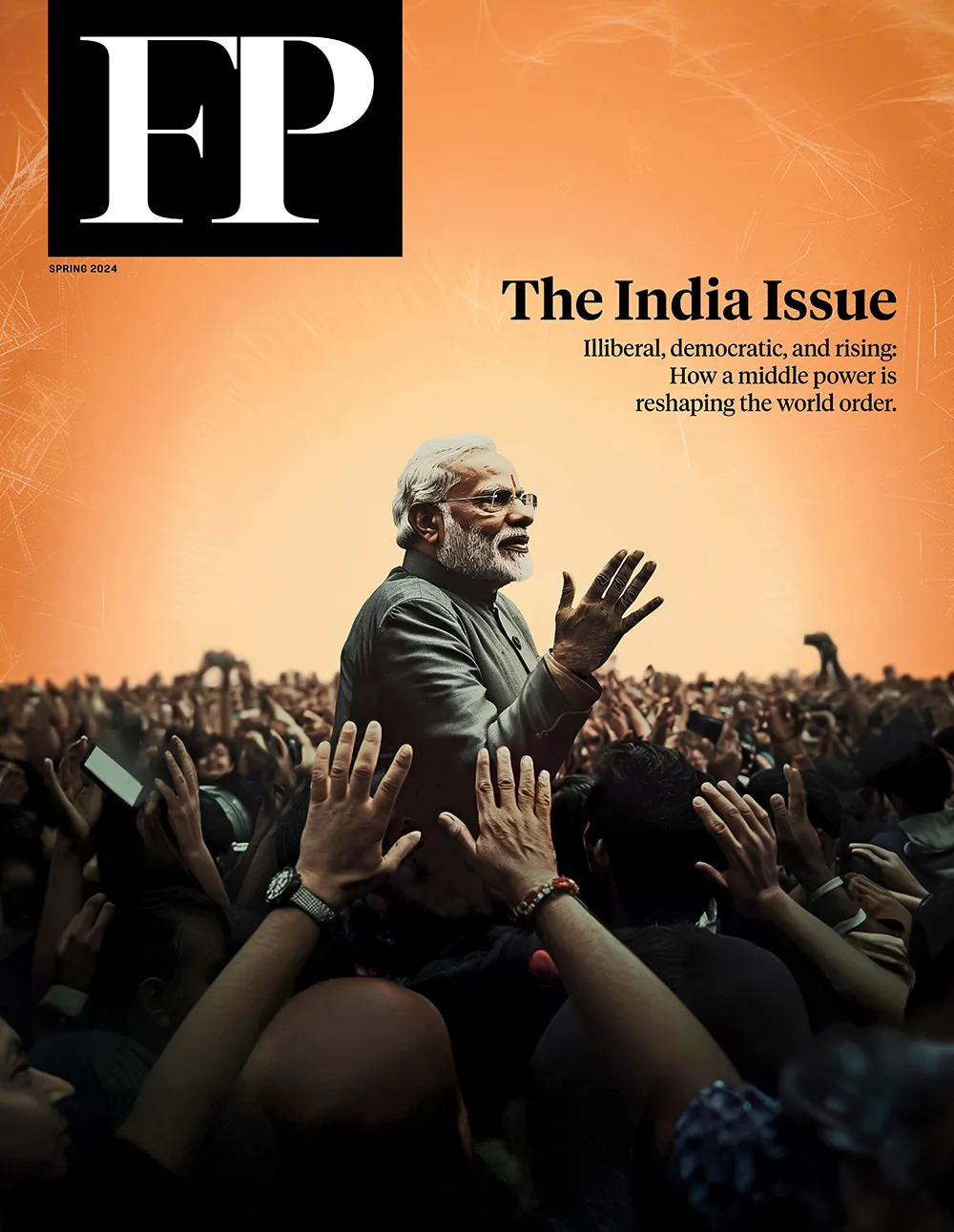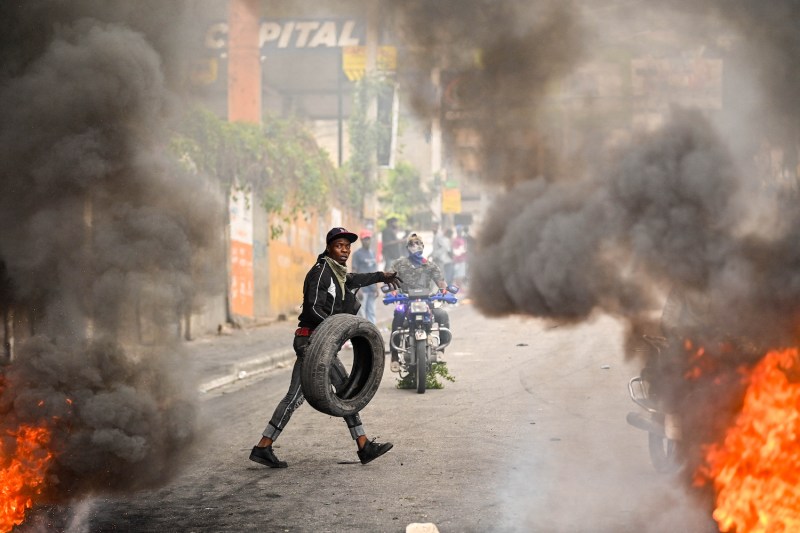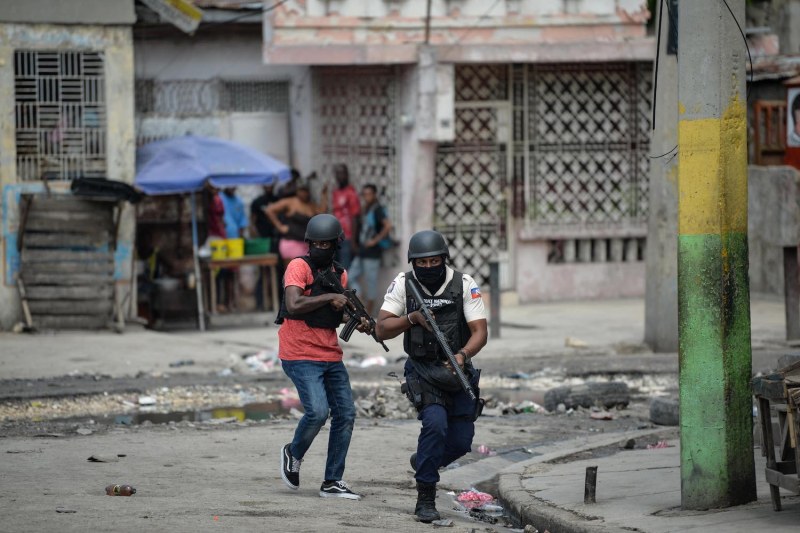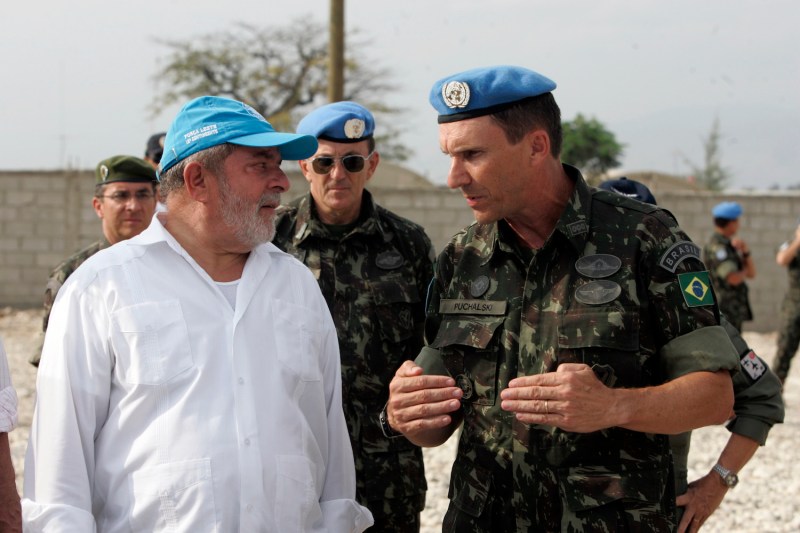The Tragedy of Haiti
The world has let this Caribbean country down for centuries. Will anything change now?
The ongoing crisis in Haiti represents the biggest security crisis in the Americas—and maybe even the Western Hemisphere—right now. And yet it gets little attention. Around 80 percent of Port-au-Prince is controlled by gangs, and it has driven tens of thousands of people to flee in the last few weeks. The airports and seaports are shut down. Food and aid are scarce. State institutions are largely in ruins.
The ongoing crisis in Haiti represents the biggest security crisis in the Americas—and maybe even the Western Hemisphere—right now. And yet it gets little attention. Around 80 percent of Port-au-Prince is controlled by gangs, and it has driven tens of thousands of people to flee in the last few weeks. The airports and seaports are shut down. Food and aid are scarce. State institutions are largely in ruins.
How did we get here? There are many moments in history one could point to as causes for the current strife. You could go as far back as the Haitian revolution that began in the 1790s—a slave rebellion that somehow ended up with Haiti paying France reparations instead of the other way round. Or you could pick the 2010 earthquake that leveled the capital and killed anywhere from 100,000 to 300,000 people, and after which Haiti has struggled to recover. But the most proximate cause of the current crisis seems to be from last month, when armed gangs took over the state while acting Prime Minister Ariel Henry was out of the country. Now, a new transitional council is being formed, and it will look to restore order while paving a path to elections in 2026.
What is the situation on the ground like, and what might happen next? I spoke with two experts on FP Live: Jacqueline Charles, a correspondent for the Miami Herald who has spent more than a decade covering Haiti; and Jake Johnston, a senior research associate at the Center for Economic and Policy Research, and the author of Aid State: Elite Panic, Disaster Capitalism, and the Battle to Control Haiti. What follows is a condensed and lightly edited transcript.
Ravi Agrawal: Jacqueline, can you describe what life is like for people on the ground right now?
Jacqueline Charles: If there is one word I can think about, it’s panic. You don’t know what every day is going to bring. You wake up and you hear the gunshots. People are telling me that when they don’t hear the gunfire, that’s when they start to panic and wonder what’s wrong, because it’s become such a constant for them now.
Unfortunately, with the vandalism, the burning, and the looting of hospitals, it’s very difficult to get health care. But people still get sick. Just last week, I interviewed a young lady who was literally watching her mother die. Her mother had not had dialysis in six weeks because the only place that she could get it, the general hospital, was not functioning because gangs had taken over that entire road.
You can’t go anywhere. If you take that risk, you don’t know whether you’re going to be the next victim. There’s no medication. The store shelves are starting to run bare. In about two weeks or less, we’re going to really start to see a humanitarian crisis. It’s not just the people in the camps, but also the people who are not in the camps, who are not going to be able to find food because the airport and the seaport have been shut down for over a month now.
RA: Jake, where do you rank this in terms of other crises Haiti has had in the past?
Jake Johnston: I think in almost every way this is unprecedented. We need to understand that this didn’t just happen a month ago. This has been a long time coming. There have been warnings about it reaching this stage for many years.
Now, nobody is speaking. The authorities that are currently in power and Henry, who is out of the country, are totally silent. The presidential council that’s being formed with the backing of international powers is also totally silent. In that absence, who is speaking are the leaders of armed groups or politicians on the ground who are advocating for very different things. Everyone’s sort of in the dark.
RA: Jacqueline, with gangs controlling so much of the movement in and out of the country, what kind of access do aid groups have right now?
JC: The U.N. recently released a report that noted 114 interruptions last month in trying to bring aid to individuals primarily in camps. Some of the private ports have managed to still get some produce in. But those individuals who have managed to get a container or two out are paying enormous prices. The price of basic food items has gone up by over 40 percent. It’s very difficult.
The reality is that the U.N. is asking for $674 million, and they have only received $45 million so far. The world is not opening its checkbooks, not even for humanitarian requests when people are dying and need food, medicine, and water. There are displacement camps where there is no aid because there just isn’t enough to go around. That, I think, is a real tragedy. We’re having to decide whose lives we attempt to save.
RA: Jake, we hear a lot about the gangs who’ve taken control of Port-au-Prince. What do they want?
JJ: I think we need to understand a few things. One is we have this ostensible coalition that came together to force Henry out. But these are very disparate actors with disparate interests. I think the reality is there’s not one goal. There are multiple goals and a lot of different interests at play here, and that’s part of why this is so confusing.
The history of armed groups in Haiti is closely linked with political and economic interests in Haiti. I think it remains so today, though, obviously, the sort of levels of coordination and control perhaps have changed in recent times.
These armed groups are exercising sort of de facto territorial control but are not actually replacing the state or taking over state control. And so, there is a real question of whether that’s their goal or if they are intending to increase bargaining power or support the political aspirations of other actors outside of these armed groups themselves.
RA: Jacqueline, it looks like a transitional council has been finalized. What do they hope to achieve?
JC: The members of this council have to figure out what their role is. The criticism coming out of Haiti is that they’ve given themselves an enormous amount of power that, constitutionally, the president would normally have. For instance, they’ve said they will hire the next prime minister, which is usually the purview of a parliament. Another concern is who should be in charge.
With this council, you have seven voting members and two observers. But you look at civil society, which has played a very active role in these years, and they’ve only been given this observer status. There are a couple of individuals who have served in government before, who are not necessarily reflecting the demographics or what you’re hearing on the streets. We’re wishing them success, but this does not look like a clear path. It looks very murky, very uncertain.
RA: Talk to us a bit more about the strength of civil society. One criticism of the way in which the world has handled various crises in Haiti over the years is that it hasn’t really empowered civil society. And, after all, for democracy to flourish, you need it to grow roots from within.
JC: One of the biggest issues with Haiti is the fact that we don’t have strong institutions—and in some cases, no institutions. When I think of Haitian civil society, I think of the human rights sector. They have literally been the watchdog on this crisis, telling us about the various massacres and attacks. In a country where everything has been crumbling for years, they have managed to stay and to be the eyes and ears.
But it’s under tremendous pressure, including threats to their own lives, for the work that they do.
RA: Jake, it’s been almost three years since [President] Jovenel Moïse was assassinated in his home. We still don’t know exactly who was responsible for that. But if you look back at Haiti’s history, how did we get here?
JJ: At the root of so much of this is the inability of Haiti to actually have a sovereign democracy. It’s been interfered with for so long, whether that be coups or overturned election results. That’s where I would start with the present situation: the overturning of the 2010-2011 election results after the earthquake. This really changed the trajectory of Haiti, both in terms of its democracy, but also accompanied by billions of dollars in foreign assistance. These two dynamics of money that largely bypassed the government, bypassed local institutions, and undermined grassroots organizing, combined with a really heavy hand on the political side of things like choosing Haiti’s leaders. We’ve seen this over the last 15 years—steadily declining participation, erosion of any faith in democracy, and the inability of Haitians to chart their own path forward. In this decimation of democracy, you’ve had this turn to paramilitary violence and settling political scores through violence rather than through other means.
That’s not just a story about Haiti. That’s a story also about the role of international actors in Haiti and foreign-policy decisions from the U.S., from the United Nations, and from other countries that have helped destabilize the situation and cause the present situation.
RA: So, Jake, let me ask you about some possible solutions. If you were to put power in the hands of Haitians and give them the ability to rebuild their state, where does that begin?
JJ: It begins with dialogue. It sounds sort of simplistic to say, but I think it’s the only path. For a year and a half, we’ve been talking about external security intervention as imminent or the only solution to Haiti’s security crisis. I think regardless of what we think about that, it’s not happening tomorrow, and Haitians can’t just sit around and wait for that.
It needs to be about what can happen now. That process needs to start with a dialogue, and not just a dialogue among seven people with CARICOM to form this council but a dialogue across the country. This is not just Port-au-Prince. This is a big country with interests all over the provinces. So how can you bridge these long-standing gaps? Between urban and rural, between Petion-Ville and Upper Port-au-Prince? There are huge divisions here, and the effort to overcome them has to be through dialogue for me.
There’s a lot of pushback on this, saying we can’t give armed groups a seat at the table. I’m not suggesting giving amnesty or things like this. But I do think we need to be honest that this is not something that can be attacked only with force, that this is a bigger issue about a broken social contract, about a state that has left big parts of the country behind. If we’re trying to bridge those gaps, if we’re trying to get at the root causes of what generates this instability and empowering the Haitian people to actually take charge of their state, they need to be a part of that discussion in some meaningful way.
RA: But aren’t there many steps before you can get to that stage? With gangs running amok across Port-au-Prince, what kind of international intervention is needed? And how would such an intervention be legitimized?
JC: I think the first thing today is security. The average Haitian wants security. They want to be able to wake up in the morning and not panic. Last year, I visited a school and when I was watching these kids, I realized that these are kids that can be at any classroom in America or elsewhere in the world. With everything I’ve seen, you develop sort of an iron heart. But I literally started crying because in that moment I started thinking about what it took every morning for those kids to come to school, and the fact that while they are there, their parents cannot depend on them being safe. Schools are no longer off limits; they are also being attacked. So I think that what we need is to figure out how to put security back.
I see the divisions that exist, and they go back centuries. But we need to start to build institutions. When you put institutions in place and provide them with support, then they can start to do the grassroots work in various communities and figure out how in this country of many realities, we find a way to move forward, even if we don’t agree. But trying to get past these divisions is not going to get us to where we need to get right away. We need to deal with security and institution-building.
Ravi Agrawal is the editor in chief of Foreign Policy. Twitter: @RaviReports
More from Foreign Policy

NATO’s New Leader Was Planning This the Whole Time
Mark Rutte, a workaholic obsessed with routine, is about to take over the West’s military alliance.

What the United States Can Learn From China
Amid China’s rise, Americans should ask what Beijing is doing right—and what they’re doing wrong.

What a War Between Israel and Hezbollah Might Look Like
The Lebanese armed group is trained and equipped much better than Hamas.

The Hidden Critique of U.S. Foreign Policy in ‘Red Dawn’
Forty years ago, Hollywood released a hit movie with a surprisingly subversive message.









Join the Conversation
Commenting on this and other recent articles is just one benefit of a Foreign Policy subscription.
Already a subscriber? .
Subscribe Subscribe
View Comments
Join the Conversation
Join the conversation on this and other recent Foreign Policy articles when you subscribe now.
Subscribe Subscribe
Not your account?
View Comments
Join the Conversation
Please follow our comment guidelines, stay on topic, and be civil, courteous, and respectful of others’ beliefs.